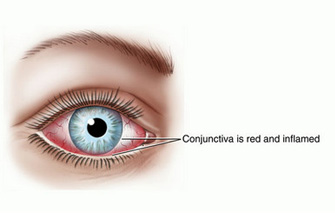ALLERGIC CONJUNCTIVITIS
 Bangalore is called the Allergy capital of India. Most patients suffering from allergies have increase in their symptoms as soon as they land in Bangalore. Conjunctiva is a thin mucus membrane covering our eyes. When exposed to irritants, this layer can react causing redness & other symptoms. When an allergen (such as pollen from trees, perfumes and cosmetics, air pollution; and smoke etc) causes the irritation, the condition is called allergic conjunctivitis.
Bangalore is called the Allergy capital of India. Most patients suffering from allergies have increase in their symptoms as soon as they land in Bangalore. Conjunctiva is a thin mucus membrane covering our eyes. When exposed to irritants, this layer can react causing redness & other symptoms. When an allergen (such as pollen from trees, perfumes and cosmetics, air pollution; and smoke etc) causes the irritation, the condition is called allergic conjunctivitis.
Most common types are Seasonal Allergic Conjunctivitis & Perennial (through out the year). Former is caused by outdoor allergens such as pollen & later by indoor allergens such as house dust, dust mites, cockroaches etc.
Symptoms of allergic conjunctivitis include:
- Redness in the white of the eye or inner eyelid
- Increased amount of tears
- Itchy eyes
- Mucus discharge
- Swelling of the eyelid
Allergic conjuctivitis is a superficial disorder & will usually not affect the vision or lead to blindness. Diagnosis is mostly clinical based on the history & clinical findings. However it may not be possible to identify the allergen always. Certain skin tests are available to identify these allergens so that they may be avoided.
Treatment
Avoidance of the allergen(s) is the mainstay in the treatment of allergies. If you can identify and avoid the particular agent that you are allergic to, your symptoms will improve dramatically. To further help alleviate your symptoms, you may want to try these tips for self-care at home.
- Reduce the allergen load. (Limit pillows, bedding, draperies, and other linens.)
- Minimize carpeting that can harbor dust mites.
- Clean regularly and thoroughly to remove dust and mold.
- Use barriers and filters.
- Cover mattresses and pillows with allergen impermeable covers.
- Use allergen filters in the air conditioner in your home. Also, be sure to change them regularly.
- Keep outdoor allergens outdoors by keeping windows and doors closed.
- Avoid pet dander and other irritants.
Unfortunately, avoidance of the allergen(s) is not always easy or possible. In this case, the following at-home treatments may provide you with some relief from your ocular allergies.
- Apply cold compresses to your eyes to help reduce the allergic reaction.
- Use artificial tears/lubricating eye drops as needed to help flush out allergens that get into your eyes.
Medications
Your eye doctor may recommend certain drops for relief of symptoms when the above measures fail. The first line of treatment is to use antihistaminic & decongestant drops which will relieve the itching & redness. Overuse of topical decongestants can lead to increased swelling and redness that can last even after you stop using the drops. This is known as a "rebound effect". Oral antihistamines also give relief of itching. A group of medicines called mast cell stabilizers are used to prevent recurrent attacks. Chilling any topical medications can help relieve redness and itching of the eyes.
If all these measures fail, your eye doctor may prescribe steroid eye drops which give dramatic relief of symptoms. However these drops have potential sight threatening side effects such as cataract formation & glaucoma (increased eye pressure). Hence these medications should be avoided or used only under strict supervision of an eye doctor.

